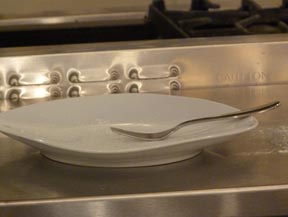My name is Jin and I am a Development Associate intern at the National Adoption Center (NAC). This is my 4th month of internship, and I have been learning about NAC’s mission, organizational structure, and functions. Mainly, I have worked in the Development Team by fundraising, creating marketing materials, working on special events, and using a database. But this week I had the opportunity to see what the Program Team does.
One of NAC’s functions is to increase awareness of children in foster care. One way they accomplish this is through the Wednesday’s Child Program on NBC10, where they feature children in foster care with Vai Sikahema, doing what the children like to do. I had the chance to be a part of a Wednesday’s Child taping. In this case Jasper, the child to be featured, enjoyed cooking.
My task for the day was to take pictures of the taping. The Wednesday’s Child Coordinator and I drove to Sur La Table in King of Prussia Mall. The activity for the day was making homemade pasta. We arrived on site and met the staff from NBC 10 and Vai Sikahema.
The kitchen in Sur La Table looked very professional. Stainless steel countertops, cabinets, large sink, large gas stoves, pots hanging from the vent, and tasting tables, it looked like a kitchen that would be on Food Network channel.
Jasper walked in soon after with two social workers. He was a quiet and gentle middle school student. After brief introductions, Angie, Vai, and Jasper crowded around the stainless steel countertop and began cooking.
They started by creating the dough for the noodles by mixing eggs, salt, olive oil, and flour.
Which
turned into dough…
Jasper rolled out the dough into noodles.
Jasper added
garlic, onions, and basil...
... to a pot, to make
his own marinara sauce…
Dishing it all up, he topped the noodles off with cheese…
But he doesn't like marinara sauce, so he chose to have pasta with butter.
The pasta must have been good, because he finished the whole plate. Actually, we all got to taste his pasta and it was delicious. I can’t help but imagine that Jasper was proud of his own cooking. He didn't show it much, but I’m sure he was glad that we all enjoyed the food that he made with his own hands.
As you can see, we finished the plate!
It was a meaningful time for me, because I was able to meet a child that I was helping. As a Development Associate, most of my time is spent at the office. The work I do indirectly benefits the children by supporting the organization financially. But sometimes that’s hard to remember at the office. So it was good to finally see a child that I have been indirectly serving.
But I imagine the day to be very meaningful to Jasper as well. He was eager to learn about cooking throughout the day. And Angie, the instructor, gave him helpful tips about cooking and let him do most of the work. Sometimes instructors are impatient and end up cooking in place of their students, but Angie stepped back and let Jasper enjoy cooking.
I hope that Jasper continues to explore, experiment, and grow in cooking, that it becomes a hobby, and maybe even a career. But more importantly, I hope that he finds a family that is committed to loving and caring for him, because he’s a great kid. (and look for his taping to air on NBC10 in Philadelphia soon!)










